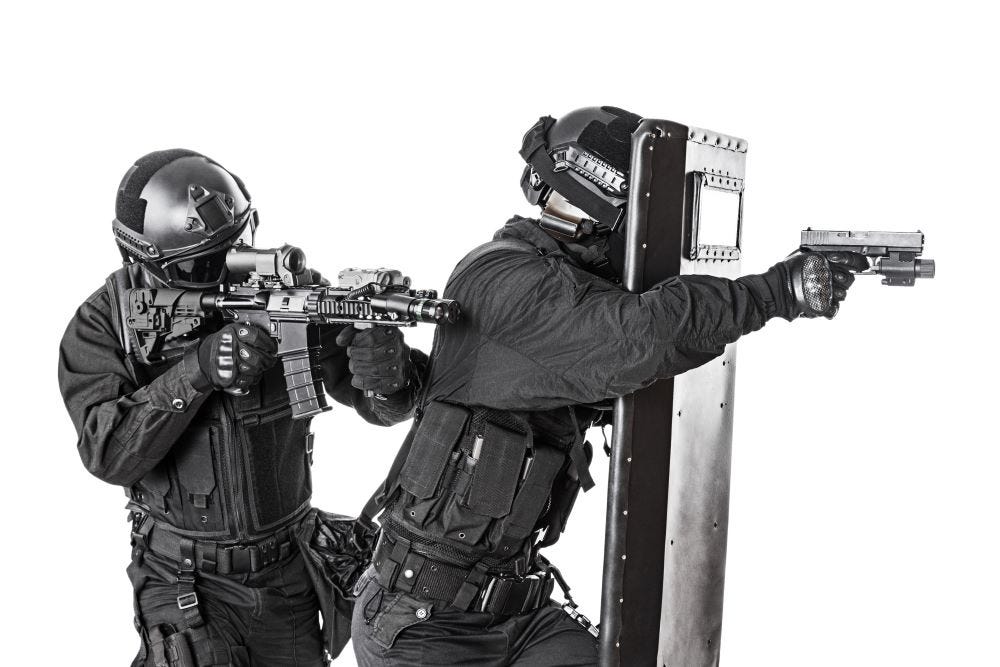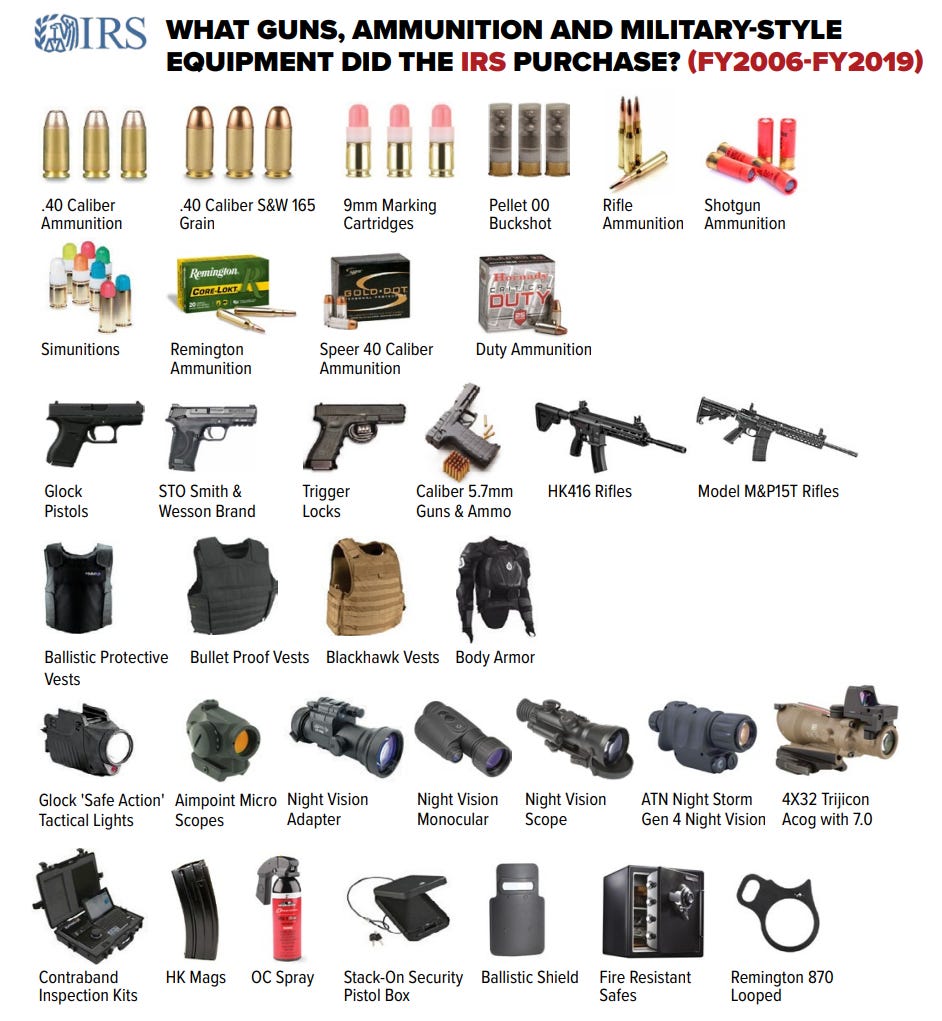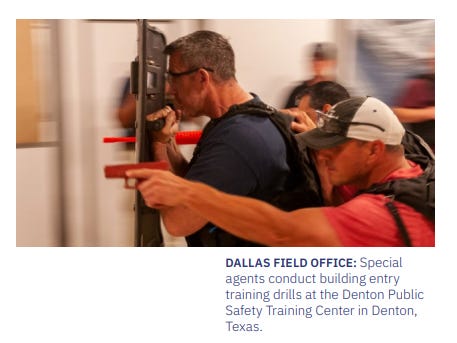Special Report: Biden Weaponizing IRS Into a Well-Armed Paramilitary Force
IRS geared up to start raiding, and the raids have started.
JUN 23, 2023
View original story on The Gun Writter Substack.
Photo illustration from licensed Shutterstock account.
by Lee Williams
Iowa Senator Joni Ernst introduced a bill last week titled “Why does the IRS Have Guns Act,” which would prohibit the IRS from buying or storing guns and ammunition, transfer all IRS firearms to the General Services Administration so they could be auctioned off to licensed gun dealers to reduce the national debt, and move the agency’s Criminal Investigation Division to the control of the Justice Department.
“The taxman is fully loaded at the expense of the taxpayer,” Ernst said in a statement. “As the Biden administration has worked to expand the size of the IRS, any further weaponization of this federal agency against hardworking Americans and small businesses is a grave concern. I’m working to disarm the IRS and return these dollars to address reckless spending in Washington.”
While the outcome of Ernst’s legislation is not promising — Joe Biden will likely veto her bill, should it ever reach his desk — the Senator’s efforts have drawn much needed attention to the massive arsenal that the IRS has amassed — is amassing.
The IRS is preparing for battle. Some of the weapons and tactical equipment currently in their inventory are used by elite military commandos, not American law enforcement officers. To be clear, none of this extreme militarization occurred until after Biden took office.
“Who are they preparing to battle?” asked Adam Andrzejewski, CEO and Founder of OpenTheBooks.com, the largest private repository of U.S. public-sector spending. Andrzejewski’s watchdog efforts have led to federal legislation, grand jury indictments, congressional hearings, subpoenas and convictions, as well as audits by the Government Accountability Office and Congressional Research Service reports.
“It looks like it’s for domestic tax and law enforcement objectives, but the IRS has blurred the lines between civil and administrative agencies, civil and administrative duties and federal law enforcement capability. After grabbing legal power, the IRS is amassing firepower. It’s time to scale back the federal arsenal,” Andrzejewski told the Second Amendment Foundation’s Investigative Journalism Project Wednesday.
In one recent report, Andrzejewski found that IRS has spent $35.2 million taxpayer dollars on guns, ammunition and tactical gear since 2006, but the agency’s purchasing increased dramatically under Biden.
“The years 2020 and 2021 were peak years at the IRS for purchasing weaponry and gear. Just since the pandemic started, the IRS has purchased $10 million in weaponry and gear,” the report states.
The purchases included:
-
$2.5 million on ballistic shields and various other gear for criminal investigation agents
-
$1.3 million for tactical lights, tactical gear bags, ballistic helmets and body armor
-
Nearly $1 million on Smith & Wesson M&P15s and Beretta tactical shotguns
-
3,000 tactical holsters for handguns with optical sights and weapon lights (As of this week, the IRS only has 2,100 armed agents.)
Graphic from “The Militarization of the U.S. Executive Agencies,” (Courtesy of OpenTheBooks.com, and used with their permission.)
Trigger-pullers wanted
The IRS is recruiting people who won’t hesitate to put another American behind their front-sight post.
In a recent job posting, the agency says special agent candidates, “must be willing to use force up to and including the use of deadly force.”
Those who qualify will receive the best guns and gear taxpayer dollars can buy.
Here is a partial list of some of the agency’s recent purchases.
Night Vision Rifle Scopes
American law enforcement — even the IRS — does not operate with Rules of Engagement like the military when it encounters armed resistance. The last time law enforcement used ROE rather than the law, things went very wrong. Whatever the tactical situation, police are subject to criminal laws and deadly force policies, which are predicated upon the sanctity of human life.
Force — up to and including deadly force — must be reasonable. An American law enforcement officer must use the minimum amount of force necessary and can use deadly force in defense of their life or the life of another. Verbal warnings and other de-escalation attempts are always considered after deadly force is used to determine whether the force was justified.
That said, it’s difficult to understand why the IRS is equipping its agents with night vision rifle scopes, which are capable of hitting man-sized targets at distance in total darkness.
How does shooting a suspect who is hundreds of yards away and unaware of an agent’s presence – at night, without warning – comply with use-of-force statutes and policies? How is this not murder? What tactical problem are the night vision rifle scopes intended to resolve?
(Photo courtesy IRS:CI Annual Report 2021)
Ballistic Shields
When the threat level is extreme, such as a report of an active shooter, SWAT teams will deploy a ballistic shield, which is designed to complement their personal body armor and further reduce the threat.
Ballistic shields come in all shapes and sizes and are rated by bullet resistance. A Level II shield will stop 9mm and other handgun rounds. A level IV shield will stop .30 caliber armor-piercing ammunition. The greater the bullet resistance, the heavier the shield. Operators must train constantly to carry the shield and shoot a pistol one-handed. It’s awkward and requires a lot of practice.
The Los Angeles Police Department has guidelines concerning the use of ballistic shields. Officers must first pass a Ballistic Shield Operator course before they can carry one into harm’s way. The course specifies the type of tactical situations where a ballistic shield should be deployed. They include but are not limited to the following:
-
Breaching (doors and windows)
-
High-risk vehicle stops
-
High-risk handcuffing
-
Door entries
-
Room clearing
-
Hallway movement
-
Rescuing wounded officers under fire
These type of tactical situations are the purview of SWAT teams and military special forces, not the IRS.
Weapons of war
The IRS issues Smith & Wesson M&P15 rifles to most of its special agents. It’s a good, serviceable patrol carbine – more than adequate for most needs. However, the agency issues HK416s to select agents. The difference between an M&P15 and an HK416 is staggering. Smith & Wesson designed their carbine for civilian end users. Heckler & Koch designed the 416 for special operations forces. It is currently the weapon of choice for the most elite units in the world, including Tier One JSOC teams. IRS even issues Heckler & Koch magazines with the rifles, which are much more reliable, but cost as much as 10-times more than traditional AR magazines.
Why do IRS agents need the same rifle carried by Navy SEALs or members of the Army’s most elite special missions unit?
While the IRS issues .40 cal. Glock handguns to its agents, documents show the agency has purchased a limited number of 5.7x28mm handguns and ammunition, although the type of ammunition has not been specified.
The Bureau of Alcohol, Tobacco, Firearms and Explosives classifies the 5.7x28mm SS190 duty round, which has a steel penetrator, as armor-piercing handgun ammunition. The manufacturer restricts the ammunition to military and law enforcement customers.
The 5.7x28mm weapon system gives IRS agents the capability of defeating most civilian body armor with a handgun.
(Photo courtesy IRS:CI Annual Report 2021)
ATF responds
The Second Amendment Foundation’s Investigative Journalism Project asked the IRS to explain why they need ballistic shields, HK416s, night vision rifle scopes and other highly specialized equipment.
Here is their response:
“IRS-CI special agents are sworn federal law enforcement officers who conduct criminal investigations into tax violations, money laundering, cybercrimes, as well as organized crime involving drugs and gangs. The agency’s approximately 2,100 IRS-CI special agents regularly execute and serve search, arrest, and seizure warrants; conduct covert operations; and interact with the public in law enforcement settings. They must participate in annual firearms training, briefings, and practical exercises to demonstrate they are proficient to carry firearms. Firearms and related tactical gear are – and have been – necessary equipment for CI special agents for more than 100 years,” said Carissa Cutrell, a member of the IRS Criminal Investigation division.
Takeaways
It’s clear the IRS geared up so they could start raiding.
Last week a joint IRS/ATF team raided Highwood Creek Outfitters in Great Falls, Montana. ATF agents were prohibited from seizing the gun shop’s 4473s, but the IRS agents weren’t. They seized thousands of the forms.
Montana Attorney General Austin Knudsen expressed concern over the seizure, asking “What the hell does the IRS need with 4473s?” By now I’m sure he realizes they were all handed over to the ATF.
History has shown us that whatever a federal agency buys, it will eventually use. The only question is who will IRS point their HK416s and night vision rifle scopes at, now that the raids have begun.
Most Americans are sick of watching Biden weaponize federal agencies to further his partisan political objectives. The ATF was weaponized first, and they’re going door-to-door right now, conducting unconstitutional knock-and-talks under the guise of firearm inspections.
If Joe Biden is allowed to fully weaponize the IRS like he did the ATF, he will be able to exert his executive authority whenever he wants without congressional oversight. Anyone who objects or complains could be shot without warning, at distance, at night, without ever seeing who fired the fatal round.
As Senator Ernst noted, this is a grave concern.
The Second Amendment Foundation’s Investigative Journalism Project wouldn’t be possible without you. Click here to make a tax-deductible donation to support pro-gun stories like this.
The Gun Writer is a reader-supported publication. To receive new posts and support my work, consider becoming a free or paid subscriber.






